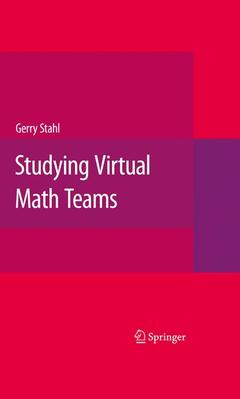Studying Virtual Math Teams, 2009 Computer-Supported Collaborative Learning Series, Vol. 11
Coordonnateur : Stahl Gerry

Studying Virtual Math Teams centers on detailed empirical studies of how students in small online groups make sense of math issues and how they solve problems by making meaning together. These studies are woven together with materials that describe the online environment and pedagogical orientation, as well as reflections on the theoretical implications of the findings in the studies. The nature of group cognition and shared meaning making in collaborative learning is a foundational research issue in CSCL. More generally, the theme of sense making is a central topic in information science. While many authors allude to these topics, few have provided this kind of detailed analysis of the mechanisms of intersubjective meaning making.
This book presents a coherent research agenda that has been pursued by the author and his research group. The book opens with descriptions of the project and its methodology, as well as situating this research in the past and present context of the CSCL research field. The core research team then presents five concrete analyses of group interactions in different phases of the Virtual Math Teams research project. These chapters are followed by several studies by international collaborators, discussing the group discourse, the software affordances and alternative representations of the interaction, all using data from the VMT project. The concluding chapters address implications for the theory of group cognition and for the methodology of the learning sciences. In addition to substantial introductory and concluding chapters, this important new book includes analyses based upon the author's previous research, thereby providing smooth continuity and an engaging flow that follows the progression of the research.
The VMT project has dual goals: (a) to provide a source of experience and data for practical and theoretical explorations of group knowledge building and (b) to develop an effective online environment and educational service for collaborative learning of mathematics. Studying Virtual Math Teams reflects these twin orientations, reviewing the intertwined aims and development of a rigorous science of small-group cognition and a Web 2.0 educational math service. It documents the kinds of interactional methods that small groups use to explore math issues and provides a glimpse into the potential of online interaction to promote productive math discourse.
Gerry Stahl teaches, publishes and conducts research in human-computer interaction (HCI) and computer-supported collaborative learning (CSCL). His recent book, Group Cognition: Computer Support for Building Collaborative Knowledge was published by MIT Press. He is founding Executive Editor of the International Journal of Computer-Supported Collaborative Learning (ijCSCL), published by Springer. He has contributed chapters to two edited volumes of the Springer CSCL series. He is the Principal Investigator of the Virtual Math Teams Project, a large 5-year research effort in collaboration with the Math Forum @ Drexel. He served as Program Chair for the international CSCL ’02 conference, Workshops Chair for CSCL ’03, CSCL ’05, ICCE ’06 and CSCL’07. He teaches undergraduate, masters and PhD courses in HCI, CSCW and CSCL at the I-School of Drexel University in Philadelphia. See CV for more details, at: http://www.cis.drexel.edu/faculty/gerry/resume.html.
Offers comprehensive theoretical framework of CSCL field
Offers an extended research agenda
Brings together previously fragmented literature
Includes supplementary material: sn.pub/extras
Date de parution : 09-2010
Ouvrage de 626 p.
15.6x23.4 cm
Disponible chez l'éditeur (délai d'approvisionnement : 15 jours).
Prix indicatif 316,49 €
Ajouter au panierDate de parution : 09-2009
Ouvrage de 626 p.
15.5x23.5 cm
Thèmes de Studying Virtual Math Teams :
Mots-clés :
CSCL; Chat; Chat Interaction Analysis; Collaborative Knowledge Building; Collaborative Learning; Explorative Learning; Group Cognition; Iterative Explorations; Knowledge Community; Online Social Practices; Virtual Spaces; Web; Web 2.0; computer-supported collaborative learning; learning; learning and instruction



